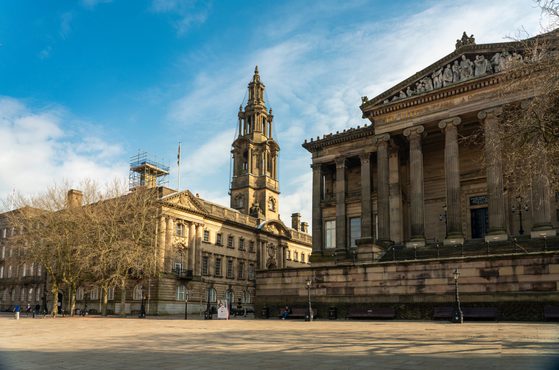London expansion & record revenues drive next phase of growth at Brabners

We’re delighted to announce the opening of a new office in London, marking a major milestone at the end of a year defined by strong financial performance.
Read more
We make the difference. Talk to us: 0333 004 4488 | hello@brabners.com
5 min read

Faye Durkin, Head of Natural Capital (North), Greengage Environmental
As someone who has worked in the environmental sector for almost two decades, I’ve been part of countless conversations about the role of nature in business, health, infrastructure, and the economy. But until the publication of the Investing in Nature for the North strategy earlier this year, I had never seen all of those arguments so clearly and comprehensively outlined in one place.
The strategy positions nature — rightly — not as a nice-to-have, but the critical asset underpinning the Northern economy. It recognises what those of us in the sector have long understood: nature is as essential public infrastructure as transport, energy and digital systems. And in the North, we have some of the richest natural capital in the UK: 75% of its moorlands, 64% of its freshwater systems, and vast swathes of grasslands, coastlines, and peat bogs.
If we lose the habitats and natural systems we’ve taken for granted, such as peatlands, we lose our natural carbon storage and flood protections. But if managed well, these natural assets offer a genuine competitive difference and measurable returns for the region and its businesses. There’s a real opportunity here to create a more resilient, nature-rich region that’s not only better equipped to handle climate shocks but is also a more attractive place to live, work and invest.
I often speak to business leaders who are just starting to think about climate risk or biodiversity. What I tell them is that it’s risky not to think about it. Climate change and nature loss are not abstract threats — they are impacting supply chains, productivity, insurance costs, and customer behaviour right now.
We’re seeing that reality in agriculture, for example. A recent episode of The Food Programme on BBC Radio 4 discussed how the global price of coffee has skyrocketed due to crop failures linked to climate change. Businesses are now scrambling to find more resilient species, relying on biodiversity they’re lucky still exists.
For Northern businesses, investing in nature is about opportunity. The strategy highlights that nature-positive business practices could unlock £8 trillion globally by 2030. Already, major firms like Aviva (and indeed, Brabners) are backing peatland restoration and rewilding projects. New finance models like Landscape Enterprise Networks (LENs) are helping food and drink giants invest directly in the natural systems their supply chains rely on — with farmers in the supply chains being incentivised to adopt regenerative practices as strategic investment.
If your business doesn’t understand its dependencies on nature, you risk falling behind the curve. But it’s not too late to start. A simple first step is mapping those dependencies and impacts, so you can see not only where you have an obligation to act with nature in mind, but where a nature-positive approach can actively benefit your bottom line.
If I had to pick one area of the strategy that resonated most deeply, it would be the emphasis on health. We have robust evidence now that time spent in nature improves mental and physical health, reduces pressure on the NHS, and boosts overall wellbeing.
Investing in access to green space is common sense prevention. And it’s part of a bigger story about reconnection. When people are closer to nature, they’re more likely to value and protect it. That’s why education is so important too — bringing nature back into schools, helping the next generation understand that the environment isn’t separate from them; it is them.
The strategy lays out six clear steps, from building a pipeline of investable nature projects to ensuring inclusivity and skills development. These are essential ideas, but delivery is everything. We need to call on government to remove systemic barriers and make nature-based solutions the default, not the exception. That includes embedding nature into planning, investing in green skills, and scaling up successful pilots.
And there’s a role for True North in all of this. It is cross-sector communities like ours, which can help bring the strategy to life. By spotlighting success stories (like Kingsdale Head), hosting events, and sharing tools and resources, we can make it easier for more organisations to act. It’s about cross-pollination — getting people from different worlds in the same room to realise that we all have a stake in this.
We also need to shift how we talk about growth. Yes, nature loss has often been driven by the pursuit of economic expansion. But the good news is that models of growth are evolving. Green finance is maturing. Investors are demanding sustainability. Insurance providers are backing nature-based risk reduction. These aren’t fringe movements anymore —they work.
Let’s not waste this opportunity. We have the evidence. We have the frameworks. We have the urgency. What we need now is the will to follow through. Because investing in nature isn’t a cost. It’s an investment in resilience, productivity, wellbeing, and long-term prosperity. It’s the foundation for a different kind of economy — one that the North is uniquely placed to lead.

We’re delighted to announce the opening of a new office in London, marking a major milestone at the end of a year defined by strong financial performance.
Read more

We explore the challenges and opportunities that Southport faces and outline how we can build a lasting legacy that other places can learn from.
Read more

We explore the challenges and opportunities facing Lancashire businesses and the solutions they’re building together.
Read more